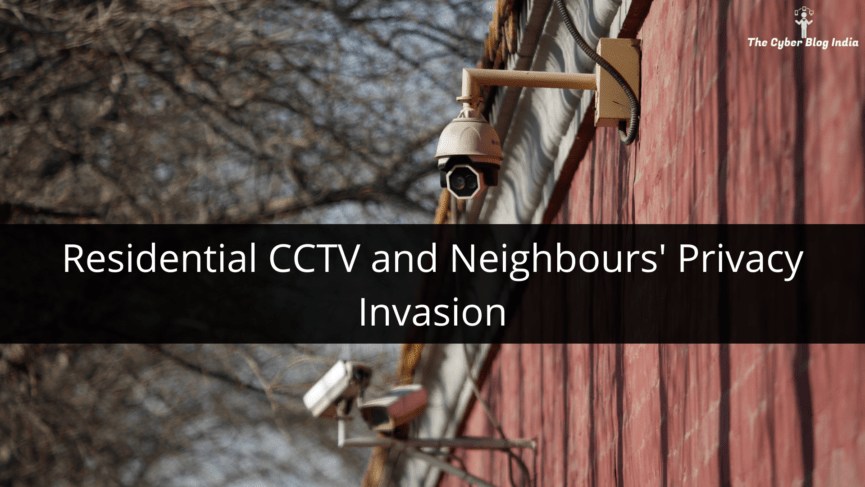Residential CCTV and Neighbours’ Privacy Invasion

The notion behind privacy is that a person should have the right to claim sovereignty over oneself. The idea for this is that the inherent value of an individual allows them to exercise privacy. Thus, such a claim must be respected. As a type of self-ownership, privacy allows individuals to have a say in topics directly related to them than anybody else. Closed Circuit Television (CCTV) entails recording activities in open public settings, including homes and offices for security purposes. However, residential CCTV may lack elements to claim privacy as it is a remote device neither close nor specifically targeted. The claim of privacy violation due to CCTV becomes a tussle of law between individual sovereignty when closed intimate spaces like homes come into question.
Can your neighbour’s CCTV camera infringe on your right to privacy?
This issue came up before the Delhi High Court in the case of Smt. Dheeraj Bala v. Rajinder Kumar (2015). The defendants installed a CCTV camera on the wall adjacent to the common stairway without the plaintiff’s approval. The stairway led to the second floor of the building. The court held that the installation of CCTV in commonly shared places in a neighbourhood cannot infringe personal space.
The bench concurred that fear of an image being morphed and disseminated, which caused the plaintiff anguish, is understandable and valid. The court also accepted the submission that the defendant’s act was unintentional. After weighing the rights and intentions, the court held that the camera on the common stairwell wall needed to be removed immediately. However, they permitted the installation on the second-floor roof or at the main gate.
Are there any specific laws on residential CCTV?
No. There are no specific laws in India regulating residential CCTV cameras. Further, there are no clear criteria to collect (file format), maintain (video length), and exhibit CCTV camera footage as evidence. Due to a lack of standards, the investigation agencies often cannot conduct an efficient investigation. However, some general provisions can be helpful:
- Section 66E of the Information Technology Act, 2000: This provision talks about capturing or transmitting a person’s private parts without their permission.
- Section 67 & 67A of the Information Technology Act, 2000: If CCTV footage is obscene or sexually explicit, and it is published or transmitted, these provisions are applicable. In case of obscenity, Section 67 provides for up to three years imprisonment and a fine of up to ₹5 lakhs. For sexually explicit content, Section 67A provides for up to five years imprisonment and a fine of up to ₹10 lakhs. You can read more about obscenity here.
What if your neighbour’s camera watches over your property?
Three factors can help decide the legality of your neighbour’s security camera watching over your property. These are:
- The purpose of the camera(s)
- The activities it records
- What does your neighbour do with the recorded videos?
Consider that your neighbour installs a CCTV camera for security purposes. This camera captures your front door, driveway, or yard, all of which are viewable from public areas. In this situation, there is no substantial ground to file a case against your neighbour as you cannot expect privacy in a publicly viewable area. Another considerable aspect in the tussle between CCTV and privacy is the handling of footage by your neighbour. If your neighbour specifically directs their camera towards your personal space, it may be surveillance and a violation of privacy. While your neighbour can film you in plain sight on your property, things are different in places you have a reasonable expectation of privacy. These places can include bathrooms, bedrooms, lavatories, locker rooms, changing and dressing rooms, and so on.
Are there any remedies?
Privacy laws in India are at a very nascent stage of their development. One cannot expect well-defined laws for every situation. There is no specific law against malefic neighbours who use CCTV cameras for nuisance and obscenity. However, one may seek recourse under the Indian Constitution and the Information Technology Act, 2000. This being said, we may need a guideline prescribing methods to dispose of CCTV data.
There are certain implied rights that you can exercise, such as:
- Ask your neighbour to inform you if there are installing CCTV cameras. They can put signboards that are easily visible and readable.
- Request your neighbour to delete CCTV footage.
- Request your neighbour not to record your video. However, given the nature of CCTV cameras, this can be extremely difficult.
To sum up,
- Installing CCTV cameras is not illegal.
- It must not infringe on your neighbour’s right to privacy if you install a CCTV camera in a shared space like a stairway and roof.
- You should consider taking the neighbour’s consent if you plan on installing a camera in the shared space.
- Using CCTV cameras to record individuals when they have a reasonable expectation of privacy is a criminal offence.
- Put easily readable signboards to indicate the use of CCTV cameras.
Featured Image Credits: City photo created by whatwolf – www.freepik.com
